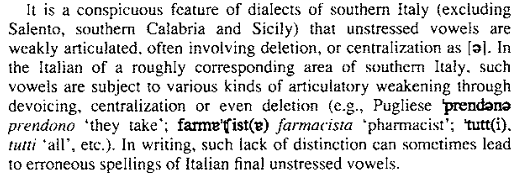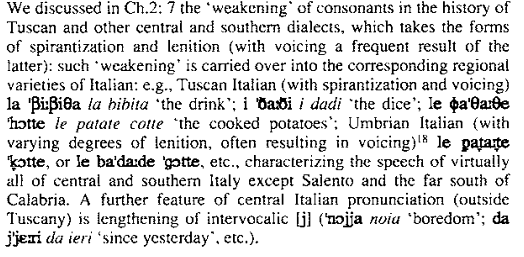Gabagool
« previous post | next post »
Dan Nosowitz — "How capicola became gabagool: The Italian New Jersey accent, explained", Atlas Obscura 11/5/2015 — explains the backstory of this video clip:
Of course, as Nosowitz explains, it's not specifically "New Jersey" — you can hear the same thing in New York City or in South Philly, where pizza might sometimes be [ɑ'bits].
A bit more detail about the geographic origins of the various sound changes involved can be found in Martin Maiden, A Linguistic History of Italian, 2014. Maiden says this about final vowel lenition/deletion:
and this about consonant voicing:
And to put this in a broader context, see e.g. André Martinet, "Celtic Lenition and Western Romance Consonants", Language 1952.
I haven't been able to find the specific geographical distribution (beyond Naples) of the o-to-u raising in the last syllable of "gabagool" — or (for another example) in turning pasta e fagioli into "past(a)e fazool" = ['pɑ.ste.fɑ'zul]:
In "pasta e fagioli" the o-raising looks like metaphony ("a process in which a high vowel has a raising influence on a preceding stressed mid or low vowel". But that won't work in "capicola" (which is apparently capocollo in standard Italian, though that doesn't help…).
Italian unstressed o is generally u in Sicilian (e.g. "Sicilianu" rather than "Siciliano"), but that doesn't help either for the stressed penultimate vowel in "capocollo" — and Sicilian doesn't generally delete final vowels either, as I understand it.


E Gilman said,
November 11, 2015 @ 11:02 am
I first encountered this pronunciation at an Italian Market in Weymouth. MA. Somebody at some time told me the pronunciation was Sicilian. I know no Italian.
Coby Lubliner said,
November 11, 2015 @ 11:52 am
Formal Italian poetry has the peculiar feature that any word-final vowel other than a can be suppressed when it follows a single consonant, e.g. Nel mezzo del cammin[o] di nostra vita. I've always wondered if this comes from the influence of some dialects, the way that in German poetry vowel pairs like ü and i are allowed to rhyme because they are indistinguishable in some dialects.
FM said,
November 11, 2015 @ 2:12 pm
If a mouth full of teeth
Stares at you from beneath
That's a moray!
Chris C. said,
November 11, 2015 @ 2:48 pm
My father was once executive chef at a large New Jersey catering house, where one specialty was manicotti. Pronounced, as he informed me the local Italians did, "manigott". We're not an Italian family, so I have no idea where that comes from either.
Stefano Taschini said,
November 11, 2015 @ 3:31 pm
I must say it took me a bit to understand that they were talking about “capocollo” [1].
A few examples:
* A Neapolitan cook using the variant "capicollo": https://youtu.be/S9aNbhN0Y_w?t=1m8s
* A guy from Calabria: https://youtu.be/Dzykg80vyDA?t=19s
* A producer from Puglia: https://youtu.be/MQdGfSimfZI?t=2m21s
As for an example of tuscan spirantization, the classical shibboleth is the sentence "Voglio una Coca-Cola con la cannuccia corta corta" (note the overcompensation by the second girl):
https://www.youtube.com/watch?v=qwOO2rNx_Is
[1] http://www.treccani.it/vocabolario/capocollo/
Stefano Taschini said,
November 11, 2015 @ 4:04 pm
As for the "fasûl", that's typical of north-eastern dialects [1]. In north-western dialects it's "faseul" ("eu" pronounced as in French) [2] or "fasöö" (in Milan, ö=oe in French). In Bologna it's "fasôl" in the singular and "fasû" in the plural [3].
In northern dialects, an intervocalic "s" is always pronounced /z/ and the circumflex accent denotes a long vowel.
[1] http://www.friul.net/dizionario_nazzi/nazzi_italiano_friulano.php?id=9727&x=1
[2] http://www.piemonteis.com/italiano-piemontese.php?PAROLA=fagiolo&Submit=Trova
[3] https://books.google.ch/books?id=iMAQwytfwkoC&printsec=frontcover&source=gbs_ge_summary_r&cad=0#v=onepage&q=fagiolo&f=false
Marc said,
November 11, 2015 @ 11:12 pm
Ah, this explains New Haven Apizza. Many restaurants have this spelling on their signs. Growing up there, I never knew how to pronounce it until some friend in high school told me "it's abeets".
https://en.wikipedia.org/wiki/New_Haven-style_pizza
https://en.wikipedia.org/wiki/Frank_Pepe_Pizzeria_Napoletana
https://en.wikipedia.org/wiki/Sally's_Apizza
https://en.wikipedia.org/wiki/Modern_Apizza
bloix said,
November 11, 2015 @ 11:59 pm
In New Haven, pizza restaurants call their product Apizza, pronounced abeets.
In Philadelphia, I have heard prosciutto pronounced prozhoot and mozzarella pronounced mootserell.
kd said,
November 12, 2015 @ 10:54 am
My Italian in-laws call sausages "zuh-zeets." Took me years to figure out they were talking about salsicca!
Rod Johnson said,
November 12, 2015 @ 11:26 am
Well, then maybe at last I can find out about this: an old girlfriend's family (Italian from the Adriatic coast somewhere I think) always made a dish (spaghetti in warm red wine, peppered) called (phonetically) [skato:n]. I've never met anyone else who recognized the word, which makes me think it might be better known as something else. Any insights?
esposito said,
November 12, 2015 @ 1:51 pm
I have no expertise in linguistics, but I grew up hearing Neapolitan spoken and was compelled to take Latin until I failed it. If I remember correctly, the Napoletano words for "the bean" are 'o fasulo (pl 'e fasule) and if fasulo is metaphonic of anything, it would be the Latin phaseolum (late Latin fasjolum) or Greek phásílos, I'm guessing. So, it's likely not a vowel shift on a Tuscan word.
A manicotto is a sleeve, hose, or cuff in Italian. Manicotti are a shape of pasta created by Italian-Americans. I prefer ravioli.
"'A pizza" is Napoletano for "a pizza" and would be pronounced sort of like "ah-peets" with maybe a schwa on the end. "The pizza" is "'na pizza", as in the hit song by the late Pino Daniele, Fatte 'na Pizza.
Lo scattone is pasta served in a some of its cooking water and a splash of red wine. The Internet tells us it's from Molise, especially Isernia and Campobasso.
Rod Johnson said,
November 12, 2015 @ 6:18 pm
Lo scattone is pasta served in a some of its cooking water and a splash of red wine. The Internet tells us it's from Molise, especially Isernia and Campobasso.
Thank you! Can I assume that the the final /e/ has undergone the same kind of apocope that's been discussed above in this thread?
Bloix said,
November 12, 2015 @ 10:09 pm
esposito – but in New Haven, Apizza is used as the word for pizza, without an article, e.g., in restaurant names:
Modern Apizza http://modernapizza.com/
Sally's Apizza http://www.sallysapizza.com/
Bobby's Apizza http://www.allmenus.com/ct/north-branford/50219-bobbys-apizza/menu/
although not Frank Pepe Pizzeria Napoletana http://www.pepespizzeria.com/
Bob Ladd said,
November 13, 2015 @ 10:42 am
@esposito – I think you have definite and indefinite articles reversed. In Neapolitan, a pizza would be the pizza and 'na pizza would be a pizza.
The main part of the post reminds me of learning an allegedly Italian expression from an Italian-American fellow undergraduate many years ago, which he pronounced something like 'fangolo' (stress on the second syllable). It was years before I realised that this must have been his rendition of a Southern variant of standard Italian (vaf)fanculo, which roughly corresponds in pragmatic force and vulgarity (though not in precise anatomical detail) to English fuck you or go fuck yourself.
Giacomo Ponzetto said,
November 14, 2015 @ 6:13 am
Take this with a large pinch of salt, because I'm from Northern Italy and I even had to resort to Wikipedia to figure out that capocollo is the Southern version of coppa.
Nonetheless, I think metaphony is the right explanation. Collo ends in a low vowel in Italian, but presumably it ends in a high vowel in the Neapolitan language(s) in question (spoken in most of peninsular Southern Italy, cf. Wikipedia). Before lenition, or in the dialects that don't weaken it, the final vowel is presumably u and not o. Hence, e.g., Italian for red is rosso, but the common surname is Russo, because in southern dialects the pronunciation presumably goes from /russu/ to /russə/ regardless of spelling.
The question is which dialects raise o to u in that position instead of diphthongizing it. Neapolitan Wikipedia has /capəcuoʎːǝ/ but warns that's from the northern range of the language(s). You do find the spelling cappacuolo in the United States.
Alon Lischinsky said,
November 16, 2015 @ 12:18 pm
@Bob Ladd: in Argentina, where a majority of the massive Italian immigration in the 20th century came from Campania, Calabria and Sicily, vafangulo has become part of the local slang. I've always wondered why it doesn't show final /o/-raising, though; Nnapulitano has vaffangulu.